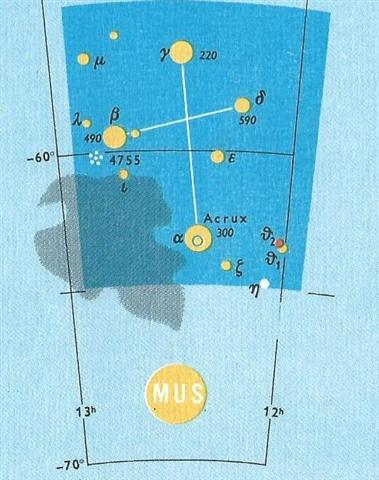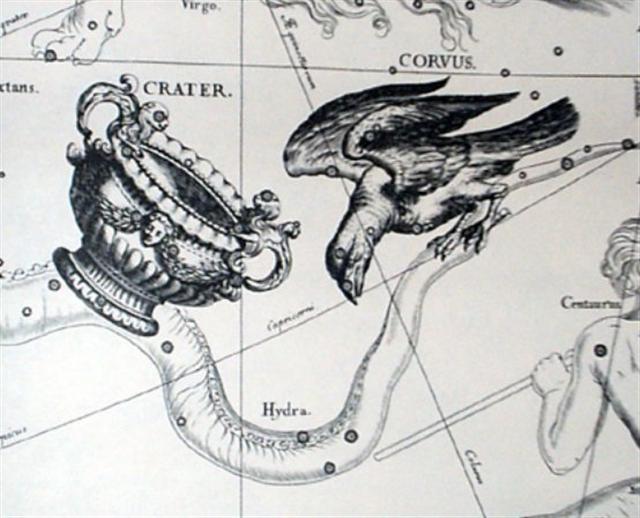17. Let's now expand our view by first of all including a few more stars in Raven and the Southern Cross, constellations which overlap in time. The idea of Raven as the constellation Corvus could have been inspired from the shape of the Coal-sack (the Black Magellanic Cloud):
As to the peculiar name Long Sand-bank (ζ Corvi) it probably refers to some ancient well known mythological feature at the beginning of time. When high tide had receded the sands on the beaches were once again uncovered. ... After the great flood had at long last receded, Raven had gorged himself on the delicacies left by the receding water, so for once, perhaps the first time in his life, he wasn't hungry. But his other appetites, his curiosity and the unquenchable itch to meddle and provoke things, to play tricks on the world and its creatures, these remained unsatisfied. Raven gazed up and down the beach. It was pretty, but lifeless. There was no one about to upset, or play tricks upon. Raven sighed. He crossed his wings behind him and strutted up and down the sand, his shiny head cocked, his sharp eyes and ears alert for any unusual sight or sound. The mountains and the sea, the sky now ablaze with the sun by day and the moon and stars he had placed there, it was all pretty, but lifeless. Finally Raven cried out to the empty sky with a loud exasperated cry. And before the echoes of his cry faded from the shore, he heard a muffled squeak. He looked up and down the beach for its source and saw nothing. He strutted back and and forth, once, twice, three times and still saw nothing. Then he spied a flash of white in the sand. There, half buried in the sand was a giant clamshell. As his shadow fell upon it, he heard another muffled squeak. Peering down into the opening between the halves of the shell, he saw it was full of tiny creatures, cowering in fear at his shadow. Raven was delighted. Here was a break in the monotony of the day. But how was he to get the creatures to come out of their shell and play with him? Nothing would happen as long as they stayed inside the giant clamshell.
They were not going to come out as long as they were so afraid of him. So Raven leaned over his head, close to the shell, and with all the cunning and skill of that smooth trickster's tongue, that had so often gotten him in and out of so many misadventures during his troubled and troublesome existence, he coaxed and cajoled and coerced the little creatures to come out and play in his wonderful shiny new world. As you know the Raven has two voices, one harsh and strident, and the other which he used now, a seductive, bell-like croon which seems to come from the depth of the sea, or out of the cave where winds are born. It is an irresistable sound, one of the loveliest in the world. It wasn't long before first one and then another of the little shell-dwellers emerged from the shell. Some scurried back when they saw the Raven, but eventually curiosity overcame their caution and all of them had crept or scrambled out. Very strange creatures they were: two legged like Raven, but otherwise very different. They had no feathers. Nor fur. They had no great beak. Their skin was pale, and they were naked except for the dark hair upon round, flat-featured heads. Instead of strong wings like raven, they had thick stick-like arms that waved and fluttered constantly. They were the first humans. For a long time Raven amused himself with these new playthings. Laughing as they explored with wonder a much expanded world. Sometimes they helped each other, sometimes they fought over something they had found. Raven even taught them some tricks, but soon he became tired of their ceaseless activity. For one thing, they were so helpless out in the world. They needed shelter from the sun and the rain. They were so fearful and seemed so small. And there were no girls among them, only boys. Raven was about to shove these tired, demanding and annoying creatures back into their shell and forget them, when, as so often happens with Raven, he had an idea for some fun. Raven began to search for the girls. For it is the way of things in the world that there are both males and females of every creature. Somewhere there must be girls. Raven searched and searched. Under logs and behind rocks, he looked. But he could not find the hiding place of the first girls. But as he searched, the tide was going out, and as it reached its lowest, the Raven spotted some giant Chitons clinging to the rocks. These giant shell fish had but one shell, fastened tightly to the rocks with huge soft lips around their edges. Raven pried one loose with his beak. And there inside was a girl. He pried off another, and another, and another in each was a girl. They were very similar to the creatures he had found in the clamshell, but more like the Chiton, softer and rounder, in contrast to the hard shell and strong muscles of the clam. And these were just as frightened of the Raven. He gathered them onto his back with difficulty, and brought them to the boys he had found in the clamshell. Raven was expecting the boy creatures to be very happy he had found the girl creatures, but to his surprise. They were frightened of them and some even ran back into the Giant clamshell to hide. The girl creatures were just as shy and huddled together watching the males with fearful and curious eyes. Both the boy and girl creatures seemed very modest and sought to cover their bodies with strips of kelp and woven sea weed from the shore ...
Evidently the Southern Cross was perceived as a kind of Fig Tree - such are always bearing at least some ripe fruits I have heard. ... the bird, being sent with a cup for water, loitered at a fig-tree till the fruit became ripe, and then returned to the god with a water-snake in his claws and a lie in his mouth, alleging the snake to have been the cause of the delay. In punishment he was forever fixed in the sky with the Cup and the Snake; and, we may infer, doomed to everlasting thirst by the guardianship of the Hydra over the Cup and its contents. From all this came other poetical names for our Corvus - Avis Ficarius, the Fig Bird; and Emansor, one who stays beyond his time; and a belief, in early folk-lore, that this alone among birds did not carry water to its young ...
|
||||||||||||||||||||||||||||||||||||||||||||||||||||||||||||||||







